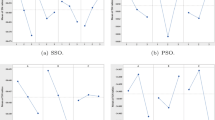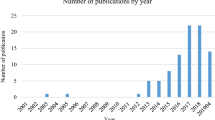Abstract
In real manufacturing environments, the control of some elements in systems based on robotic cells, such as transport robots has some difficulties when planning operations dynamically. The Job Shop scheduling Problem with Transportation times and Many Robots (JSPT-MR) is a generalization of the classical Job Shop scheduling Problem (JSP) where a set of jobs additionally have to be transported between machines by several transport robots. Hence, the JSPT-MR is more computationally difficult than the JSP presenting two NP-hard problems simultaneously: the job shop scheduling problem and the robot routing problem. This paper proposes a hybrid metaheuristic approach based on clustered holonic multiagent model for the JSPT-MR. Firstly, a scheduler agent applies a Neighborhood-based Genetic Algorithm (NGA) for a global exploration of the search space. Secondly, a set of cluster agents uses a tabu search technique to guide the research in promising regions. Computational results are presented using two sets of benchmark literature instances. New upper bounds are found, showing the effectiveness of the presented approach.
















Similar content being viewed by others
References
Abdelmaguid TF, Nassef AO, Kamal BA, Hassan MF (2004) A hybrid ga/heuristic approach to the simultaneous scheduling of machines and automated guided vehicles. Int J Prod Res 42(2):267–281
Anwar MF, Nagi R (1998) Integrated scheduling of material handling and manufacturing activities for just-in-time production of complex assemblies. Int J Prod Res 36(3):653–681
Babu AG, Jerald J, Haq AN, Luxmi VM, Vigneswaralu TP (2010) Scheduling of machines and automated guided vehicles in fms using differential evolution. Int J Prod Res 48(16):4683–4699
Bellifemine F, Poggi A, Rimassa G (1999) Jade - a fipa-compliant agent framework. In: Proceedings of the fourth International Conference and Exhibition on The Practical Application of Intelligent Agents and Multi-Agent Technology, pp 97–108
Bilge U, Ulusoy G (1995) A time window approach to simultaneous scheduling of machines and material handling system in an fms. Oper Res 43(6):1058–1070
Botti V, Giret A (2008) ANEMONA: A Multi-agent Methodology for Holonic Manufacturing Systems. Springer Series in Advanced Manufacturing. Springer
Bozejko W, Uchronski M, Wodecki M (2010) The new golf neighborhood for the flexible job shop problem. In: Proceedings of the International Conference on Computational Science, pp 289–296
Braga RAM, Rossetti RJF, Reis LP, Oliveira EC (2008) Applying multi-agent systems to simulate dynamic control in flexible manufacturing scenarios. In: European meeting on cybernetics and systems research, Austrian society for cybernetic studies, vol 2, pp 488–493
Calabrese M (2011) Hierarchical-granularity holonic modelling. Doctoral thesis. Universita degli Studi di Milano, Milano
Caumond A, Lacomme P, Moukrim A, Tchernev N (2009) An milp for scheduling problems in an fms with one vehicle. Eur J Oper Res 199(3):706–722
Deroussi L, Norre S (2010) Simultaneous scheduling of machines and vehicles for the flexible job shop problem. In: International Conference on Metaheuristics and Nature Inspired Computing, pp 1–2
Deroussi L, Gourgand M, Tchernev N (2008) A simple metaheuristic approach to the simultaneous scheduling of machines and automated guided vehicles. Int J Prod Res 46(8):2143–2164
Erol R, Sahin C, Baykasoglu A, Kaplanoglu V (2012) A multi-agent based approach to dynamic scheduling of machines and automated guided vehicles in manufacturing systems. Appl Soft Comput 12(6):1720–1732
Ferber J (1999) Multi-agent Systems: An Introduction to Distributed Artificial Intelligence, 1st edn. Addison-Wesley Longman Publishing Co., Inc., Boston
Giret A, Botti V (2004) Holons and agents. J Intell Manuf 15(5):645–659
Glover F, Kelly JP, Laguna M (1995) Genetic algorithms and tabu search: Hybrids for optimization. Comput Oper Res 22(1):111–134
Hurink J, Knust S (2002) A tabu search algorithm for scheduling a single robot in a job-shop environment. Discret Appl Math 119(1-2):181–203
Hurink J, Knust S (2005) Tabu search algorithms for job-shop problems with a single transport robot. Eur J Oper Res 162(1):99–111
Johnson SC (1967) Hierarchical clustering schemes. Psychometrika 32(3):241–254
Jones A, Rabelo LC (1998) Survey of job shop scheduling techniques. Tech. rep., National Institute of Standards and Technology, Gaithersburg, USA
Koestler A (1967) The Ghost in the Machine, 1st edn. Hutchinson, London
Komma VR, Jain PK, Mehta NK (2011) An approach for agent modeling in manufacturing on jade reactive architecture. Int J Adv Manuf Technol 52(9-12):1079–1090
Lacomme P, Larabi M, Tchernev N (2007) A disjunctive graph for the job-shop with several robots. In: Multidisciplinary international conference on scheduling : Theory and applications. MISTA, Paris, pp 285–292
Lacomme P, Larabi M, Tchernev N (2013) Job-shop based framework for simultaneous scheduling of machines and automated guided vehicles. Int J Prod Econ 143(1):24–34
Lee K, Yamakawa T, Lee KM (1998) A genetic algorithm for general machine scheduling problems. In: Proceedings of the second IEEE international Conference on Knowledge-Based Intelligent Electronic Systems, pp 60–66
Lenstra JK, Kan A HGR (1979) Computational complexity of scheduling under precedence constraints. Annals of Discrete Mathematics 4:121–140
Lenstra JK, Kan A HGR (1981) Complexity of vehicle routing and scheduling problems. Networks 11 (2):221–227
Mastrolilli M, Gambardella L (2000) Effective neighbourhood functions for the flexible job shop problem. J Sched 3(1):3–20
Muth JF, Thompson GL (1963) Industrial scheduling. International series in management. Prentice-Hall
Pundit R, Palekar U (1990) Job shop scheduling with explicit material handling considerations. Tech. rep., Univ. of Illinois at Urbana-Champaign, Dept. of M. and I.E
Raman N, Talbot FB, Rachamadgu RV (1986) Simultaneous scheduling of machines and material handling devices in automated manufacturing. In: Inproceedings of the 2nd ORSA/TIMS Conference on Flexible Manufacturing Systems, pp 455–466
Reddy BSP, Rao CSP (2006) A hybrid multi-objective ga for simultaneous scheduling of machines and agvs in fms. Int J Adv Manuf Technol 31(5–6):602–613
Sonmez AI, Baykasoglu A (1998) A new dynamic programming formulation of (nm) flow shop sequencing problems with due dates. Int J Prod Res 36(8):2269–2283
Storn R, Price K (1995) Differential evolution: A simple and efficient adaptive scheme for global optimization over continuous spaces. Tech rep. International Computer Science Institute, Berkeley
Ulusoy G, Erifolu FS, Bilge U (1997) A genetic algorithm approach to the simultaneous scheduling of machines and automated guided vehicles. Comput Oper Res 24(3):335–351
Zhang Q, Manier H, Manier MA (2012) A genetic algorithm with tabu search procedure for flexible job shop scheduling with transportation constraints and bounded processing times. Comput Oper Res 39(7):1713–1723
Zhang Q, Manier H, Manier MA (2014) A modified shifting bottleneck heuristic and disjunctive graph for job shop scheduling problems with transportation constraints. Int J Prod Res 52(4):985–1002
Author information
Authors and Affiliations
Corresponding author
Ethics declarations
Conflict of interests
The authors declare that they have no conflict of interest.
Ethical approval
This paper does not contain any studies with human participants or animals performed by any of the authors.
Informed consent
Informed consent was obtained from all individual participants included in this paper.
Rights and permissions
About this article
Cite this article
Nouri, H.E., Driss, O.B. & Ghédira, K. Hybrid metaheuristics for scheduling of machines and transport robots in job shop environment. Appl Intell 45, 808–828 (2016). https://doi.org/10.1007/s10489-016-0786-y
Published:
Issue Date:
DOI: https://doi.org/10.1007/s10489-016-0786-y




